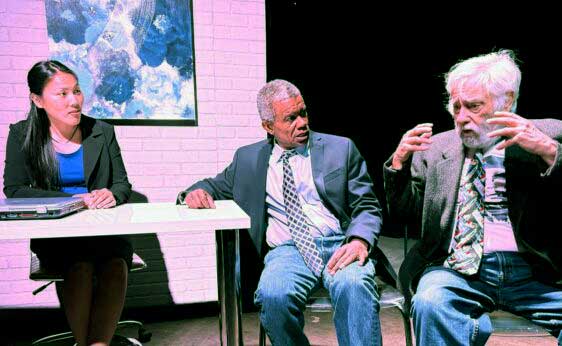
LOS ANGELES — In the West Coast premiere of Gary Morgenstein’s 80-minute dramedy A Black and White Cookie, two principal leads, Harold Wilson (Tommy Franklin) and Albie Sands (Morry Schorr) confound and confront ethnic stereotypes in an attempt to ward off the evil corporate landlord that is forcing Harold out of the little newsstand and snack bar he’s operated for the past 30 years.
As they get to know each other better, both characters learn that their friend is not quite what they imagined them to be: Harold, 71, is no Black crusader for systemic justice—in fact, he’s a proud former Marine who served in Vietnam fighting “the gooks” and has voted Republican all his life. And Albie, a still passionate 60s Jewish radical who claims he had once served as deputy press secretary to the Communist Party’s Gus Hall, is not, as the religious stereotype would have it, after any monetary payout Harold might receive.

As any New Yorker knows, a black and white cookie is a classic deli treat, a large cookie with half-chocolate and half-vanilla frosting. The yin-yang concept is a metaphor for this unlikely partnership between two opinionated old-timers who may have one more noble battle to wage.
Albie has at most a nodding acquaintance with Harold after he’s been ordering a microwaved ham and swiss sandwich every day for the last ten years. He also asks Harold to save yesterday’s New York Times—the corporate news is “all propaganda anyway.” Now Harold faces imminent eviction by the firm Albie calls a “corporate parasite,” having reopened his stand post-COVID only to find his rent has skyrocketed.
Other characters include Carol, Harold’s antisemitic niece (Aisha Kabia), a lesbian who distrusts Albie’s intentions. She wants Harold to take the landlord’s buyout, sell off his rapidly deteriorating, twice-mortgaged house, and move down to Clearwater, Florida, with her. There’s Mitchell (Dylan Bowers), who operates a Marxist website and does a little publicity for the “Hell No! He Won’t Go!” rent strike. And finally, Ms. Pham (Laura Trent), a corporate agent who will not budge from the proposed rent increase, but does listen sympathetically, as the child of anti-Communist Vietnamese parents, to Harold’s terrifying recall of his wartime exploits.
At a certain point, as the crowd gathers to help save the newsstand, audience members are recruited to join in on the anti-corporate chanting. For the unkempt, derelict Albie, this campaign is his long awaited “political comeback.”
The clock ticks down, and tensions around race and religion, politics, COVID, and personal hygiene heighten. As seminal issues such as the Holocaust and African-American slavery arise, Albie reflects, “I guess there’s a reason we always have to keep reminding people.”
As we delve further into Albie’s history, we understand where his soapbox grandstanding sloganeering comes from. That character trait reminds those of us who are politically active exactly what to avoid. The casual bluster we comfortably utter among friends about greedy slumlord bastards may all be true, but organizing takes more than slogans. And as we learn more about Harold, we understand that both these men, more complex than at first view, had been ostracized from their families for their beliefs.
A comedy ends well, of course, yet the outcome is not so easily won. The better angels of our human nature are summoned in the interest of solidarity. “We shall overcome” indeed.
With his warm and loving conceit of these characters, playwright Morgenstein embraces their issues empathetically as his own. While the niece Carol is a secondary character to the widowed, health-challenged Harold, she is barely fleshed out. Where do her particular phobias and biases come from? How, other than owning the label, does her lesbianism inform her choices and behavior? Even less developed are Mitchell and Ms. Pham, whose appearances in the play, especially his, are scant, and arguably not even required from a dramatic point of view.
The Brooklyn-based playwright’s other pieces include A Tomato Can’t Grow in the Bronx, Free Palestine, and Walking Charlie. His novels include A Mound Over Hell, A Fastball for Freedom, and A Dugout for Peace. He clearly is interested in social issues, the Israel-Palestine conflict, and baseball, all of which are referenced in this play.

Tudi Roche directs. She also provides the production design, which works well on the modest-sized stage. Lighting design is by Selena Price. Sound design is by Ben Rock, and the stage manager is Stephen Juhl.
An audience knows that comedy exaggerates and illuminates, but maybe the playwright goes too far. Albie’s dated street corner rants, aimed at his favorite capitalist targets, can be accepted as the springboard for humor. His use of a traffic cone as a bullhorn is charming. I found the accretion of modern-day conspiracy theories about vaccines and disease, however, a little over the top for my taste, but hey, we all know friends and comrades who have lost their edge after a lifetime of being oppositional. And the deus ex machina ending seems forced and unearned.
In all, though, A Black and White Cookie, with its two really fine leads, is a sweet delivery system for an affecting education in struggle and life. The theater itself, which I had never visited before now, is worth getting to know.
A Black and White Cookie plays at the 905 Cole Theatre, 905 N. Cole Ave., Hollywood 90038, through Aug. 20, Fri. and Sat. at 8 p.m., and Sun. at 3 p.m. Go here for online ticketing.
We hope you appreciated this article. At People’s World, we believe news and information should be free and accessible to all, but we need your help. Our journalism is free of corporate influence and paywalls because we are totally reader-supported. Only you, our readers and supporters, make this possible. If you enjoy reading People’s World and the stories we bring you, please support our work by donating or becoming a monthly sustainer today. Thank you!










